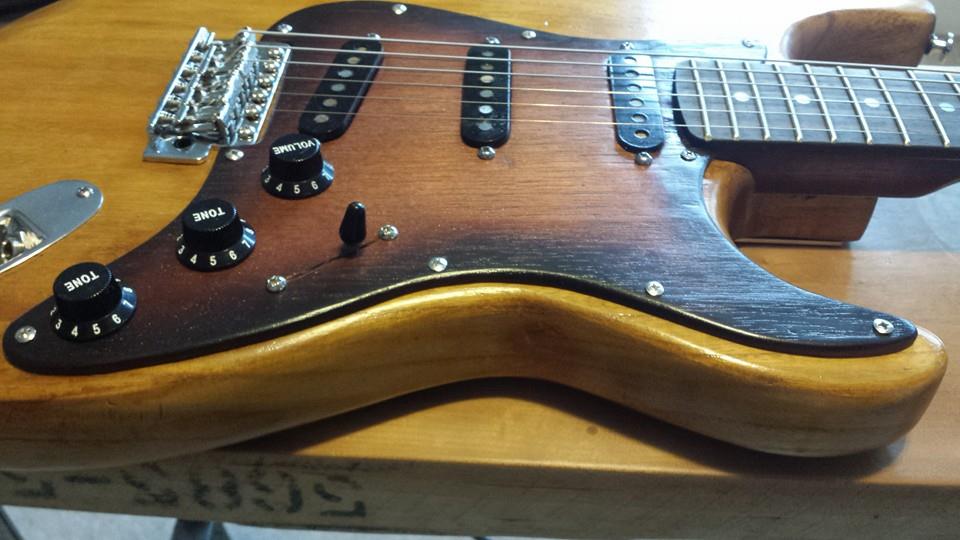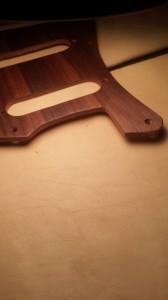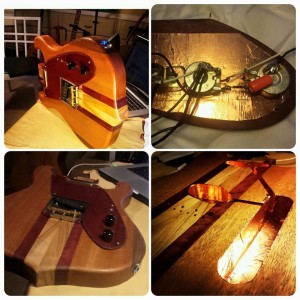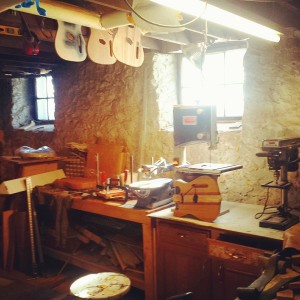Electric Trees – Wood, Wire, and Music: An Interview with Dave Hanlon
 I first met Dave Hanlon around a table, which makes a lot of sense because Dave also makes tables…and beds and bureaus and all sorts of things from reclaimed wood and 17th century doors. The guy is impressive. We were, however, sitting around a table making music at our favorite local dive for anyone who would listen. Dave is still an incredible talent at making music but has recently launched into helping others do the same and do so on really beautiful and well set up instruments. His venture into guitar building, luthiery of all sorts and instrument set ups has had me drooling when I check out his instagram and brought my gear acquisition syndrome go into high gear…today we catch up with Hanlon to talk about how he got into wood working and the projects he has been working on. Seriously, buy a guitar from this guy. A custom, gorgeous telecaster vs. one that has been hanging by its neck in a big box store for months? Seriously, the choice should be obvious here.
I first met Dave Hanlon around a table, which makes a lot of sense because Dave also makes tables…and beds and bureaus and all sorts of things from reclaimed wood and 17th century doors. The guy is impressive. We were, however, sitting around a table making music at our favorite local dive for anyone who would listen. Dave is still an incredible talent at making music but has recently launched into helping others do the same and do so on really beautiful and well set up instruments. His venture into guitar building, luthiery of all sorts and instrument set ups has had me drooling when I check out his instagram and brought my gear acquisition syndrome go into high gear…today we catch up with Hanlon to talk about how he got into wood working and the projects he has been working on. Seriously, buy a guitar from this guy. A custom, gorgeous telecaster vs. one that has been hanging by its neck in a big box store for months? Seriously, the choice should be obvious here.
Red: So Dave, I know you well but for folks out there, who are you and what do you do?
DH: I grew up in Northeastern Massachusetts in Gloucester, a seaside peninsula known for its fishing industry and other unfortunate happenings in the news. My parents are both artists, my father played the bass for 30 years and supported my choice to treat the bass and guitar as more than a hobby. I graduated from Berklee in 2012, where I learned how to chain-smoke, develop a false sense of superiority, and apply classical counterpoint to jazz theory. I am currently playing with several bands; Pray For Mojo (originals), Blonde on Blue (jazz) , Lords of Flannel (hard rock covers) and doing Pink Floyd tribute shows with the local band Grassroot.
Red: You had always been a woodworker of sorts, aside from the obvious fact that you are a musician and Berklee grad, what made you leap into luthiery? Both setups and eventual custom builds?
 DH: I have been doing woodworking in some form for my whole life. I didn’t go to school for this, I learned from other woodworkers, books, and from screwing things up over and over again until I was happy I have always had a need to take things apart, to learn how they work. It’s not enough for me to look at something and say “okay, that’s how it is”. I need to question everything. If you tell me something is strong, I want to try to break it. If you tell me something is beautiful, I want to try to test it’s beauty by comparing it with similar things. The modding, fixing, and building…it all started with a butterscotch squier tele that I hacked to bits. First I replaced the tuners with locking Sperzel’s, and it was good. Then I replaced the whole neck with a Warmoth AAA flame maple on maple neck, and it was good. Then I replaced the whole body, pickups, and guts. By this point it was now a completely different guitar and I was left with a bunch of junk, so I stripped it to the wood and taught myself how to do clean spray finishes and how to rout a pickup hole. I ripped the frets out of the neck, refinished it, put in my own fret markers on the side, did a totally awful job, and ended up selling the mess of what was left of it for ebay for about what I paid for the guitar in the first place. I repeated this process until I was confident enough to work on nice guitars and I started making “partsocasters” as they are adoringly called by those who like building Fenders from parts. I would do my own finishes and choice of hardware and woods, but I wasn’t building anything from scratch aside from the mahogany and cedar pickguards I cut in my little basement shop here in Malden. After some time, and selling five of these guitars, I wasn’t satisfied and had to start making my own bodies. I’ve got one complete and three more in the works. You can see them on my facebook and instagram pages (real website coming soon)
DH: I have been doing woodworking in some form for my whole life. I didn’t go to school for this, I learned from other woodworkers, books, and from screwing things up over and over again until I was happy I have always had a need to take things apart, to learn how they work. It’s not enough for me to look at something and say “okay, that’s how it is”. I need to question everything. If you tell me something is strong, I want to try to break it. If you tell me something is beautiful, I want to try to test it’s beauty by comparing it with similar things. The modding, fixing, and building…it all started with a butterscotch squier tele that I hacked to bits. First I replaced the tuners with locking Sperzel’s, and it was good. Then I replaced the whole neck with a Warmoth AAA flame maple on maple neck, and it was good. Then I replaced the whole body, pickups, and guts. By this point it was now a completely different guitar and I was left with a bunch of junk, so I stripped it to the wood and taught myself how to do clean spray finishes and how to rout a pickup hole. I ripped the frets out of the neck, refinished it, put in my own fret markers on the side, did a totally awful job, and ended up selling the mess of what was left of it for ebay for about what I paid for the guitar in the first place. I repeated this process until I was confident enough to work on nice guitars and I started making “partsocasters” as they are adoringly called by those who like building Fenders from parts. I would do my own finishes and choice of hardware and woods, but I wasn’t building anything from scratch aside from the mahogany and cedar pickguards I cut in my little basement shop here in Malden. After some time, and selling five of these guitars, I wasn’t satisfied and had to start making my own bodies. I’ve got one complete and three more in the works. You can see them on my facebook and instagram pages (real website coming soon)
Red: So what’s been your favorite project to date? How about the most challenging?
DH: My favorite project to date is a telecaster I built from scratch out  of Purpleheart, Walnut, Honduran Mahogany, and Ambrosia Maple. It is a striped creature with handwound pickups from Geppetto Guitars in Austin, All American components, a boost switch, a bookmatched three-wood pickguard where the pickup sits flush with the wood, and an understated hand-oiled and sanded finish. I prefer not to seal wood up with clear coating unless I have to. I do work with nitrocellulose, polyacrylic, etc finishes, but oiling a beautiful piece of wood is really the best part of the build process. No one tells you that 60% of it is endless hand sanding..
of Purpleheart, Walnut, Honduran Mahogany, and Ambrosia Maple. It is a striped creature with handwound pickups from Geppetto Guitars in Austin, All American components, a boost switch, a bookmatched three-wood pickguard where the pickup sits flush with the wood, and an understated hand-oiled and sanded finish. I prefer not to seal wood up with clear coating unless I have to. I do work with nitrocellulose, polyacrylic, etc finishes, but oiling a beautiful piece of wood is really the best part of the build process. No one tells you that 60% of it is endless hand sanding..
Red: And where do you see this going in the future? Do you want to have a more regional, national footprint with your guitars?
DH: As far as the future holds, I am just trying to better my craft. I have been self-employed doing this and teaching for a while now and I haven’t starved to death yet so I must be doing something right. I just want to have my niche among the New England builders. This is my home and I will probably die here. My plan for Electric Trees is to get into more sustainable methods and using more reclaimed and recycled materials. I have an immense resource for 100+ year old wood from my connections with my dads custom furniture shop and all of the antiques in Essex and Gloucester. There is really interesting character in old wood, painted, oiled, or plain, that you can’t create on new wood. I want to cut guitars out of doors, tables, headboards, anything, really. If you come home and there’s a Stratocaster shaped void missing from your bureau, you’d best come knocking at my door. Lately, I have been using all this precious wood and it’s really beautiful but I have a soft spot for the trees too, you know? I am a closet hippie covered in sawdust who sees that sawdust as the blood of a living thing that could have grown another 20 feet. All I can tell you is my next customs are going to look a lot different from what you’ve been seeing from my social media presence lately. If only half the people like them, then I’ve done my job right. I want to challenge your idea of what an electric guitar is supposed to look like…
Check out Dave Hanlon’s pages at:
https://www.facebook.com/Electrictreesdesign
https://instagram.com/electrictrees/
And while you are at it…some of his music here:

